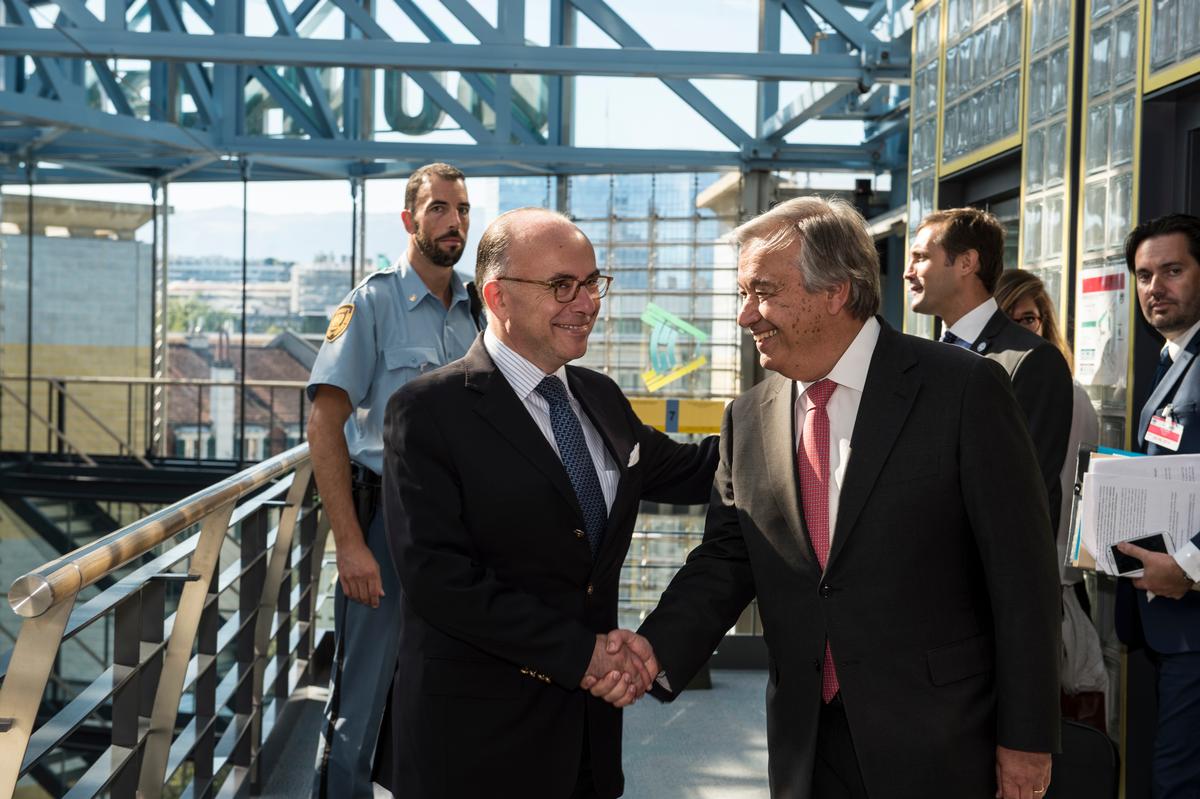Guterres wraps up fruitful first visit to Central Asia
Guterres wraps up fruitful first visit to Central Asia

ASTANA, Kazakhstan, November 16 (UNHCR) - UNHCR chief, António Guterres, has concluded his first visit to Central Asia by agreeing to boost refugee assistance in the Kyrgyz Republic and by urging Kazakhstan to play a greater role in addressing global asylum-migration issues.
Highlights of the High Commissioner for Refugee's five-day visit ending Thursday included the opening of a reception centre for asylum seekers in the Kyrgyz capital, Bishkek, and the signing in Astana of a country cooperation agreement with Kazakhstan.
Starting his visit in Bishkek, Guterres on Monday met President Kurmanbek Bakiev as well as the Kyrgyz prosecutor general, the minister of foreign affairs and the chairperson of the State Committee on Migration and Employment, which deals with asylum and refugee issues.
He thanked them for respecting refugee rights in a difficult political environment, and for naturalizing thousands of Tajik refugees. He also stressed his commitment to reducing statelessness in the country, believed to affect more than 10,000 people.
Asked if he had discussed the extradition of Uzbek refugees with the Kyrgyz authorities, the High Commissioner stressed that some individual cases could not blind the fact that hundreds of Uzbek refugees were granted assistance in the Kyrgyz Republic.
"I had open discussions on the topic with the president and the acting foreign minister," he said. "I made it clear that refugees should not be extradited if there is a danger of them being persecuted, as it was the case with people who fled from Uzbekistan following the events in Andijan in May 2005.
"Nevertheless, the country's authorities then demonstrated adherence to obligations to protect refugee rights and courage in those conditions. Our disagreements in the past will pave the way for future cooperation."
While in Bishkek, Guterres opened the region's first reception centre for asylum seekers. It offers temporary shelter as well as interview, medical and information facilities to refugees and asylum seekers. After listening to some refugees' problems, he told them, "We serve you, we work for you." He later decided to allocate more funds for assistance and integration activities.
Kyrgyzstan, which signed the 1951 Refugee Convention and its 1967 Protocol in 1996, hosts several hundred refugees and asylum seekers from Afghanistan, the Russian Federation, Tajikistan and Uzbekistan. Some 9,000 Tajik refugees have received Kyrgyz citizenship.
In Astana on Wednesday, the High Commissioner met Kazakh President Nursultan Nazarbayev and other high-ranking officials such as the ombudsman and the chairman of the Human Rights Commission.
Kazakhstan ratified the 1951 Convention and its protocol in 1999 and is drafting a national refugee law in cooperation with UNHCR. Guterres was assured that the law would be a model legislation for countries in the region as it seeks to strike a balance between Kazakhstan's national concerns and international obligations in the sphere of refugee and human rights.
He noted that Kazakhstan's political stability and economic development has made it a magnet for different groups of people, including some who may need international protection. In this context, he called for Kazakhstan to get more involved in helping to define UNHCR strategies on the migration-asylum nexus, and to contribute to international debates on this issue.
Earlier in the day, the High Commissioner signed UNHCR's country cooperation agreement with Kazakh Foreign Minister Marat Tazhin. "This document will become a legal basis for cooperation between our state and UNHCR's branch," Tazhin told reporters.
"It will regulate the activities of UNHCR in Kazakhstan and establish the rights and commitments of its staff, as well as clearly specify the sides' commitment on the implementation of the agreement," he added.
There are some 3,700 Chechens from the Russian Federation, several hundred people from Afghanistan, Uzbekistan and China who are of concern to UNHCR in Kazakhstan.
By Madina Zhanuzakova in Astana, Kazakhstan
with Ayana Djanybekova in Bishkek, Kyrgyz Republic
and Vivian Tan in Islamabad, Pakistan






